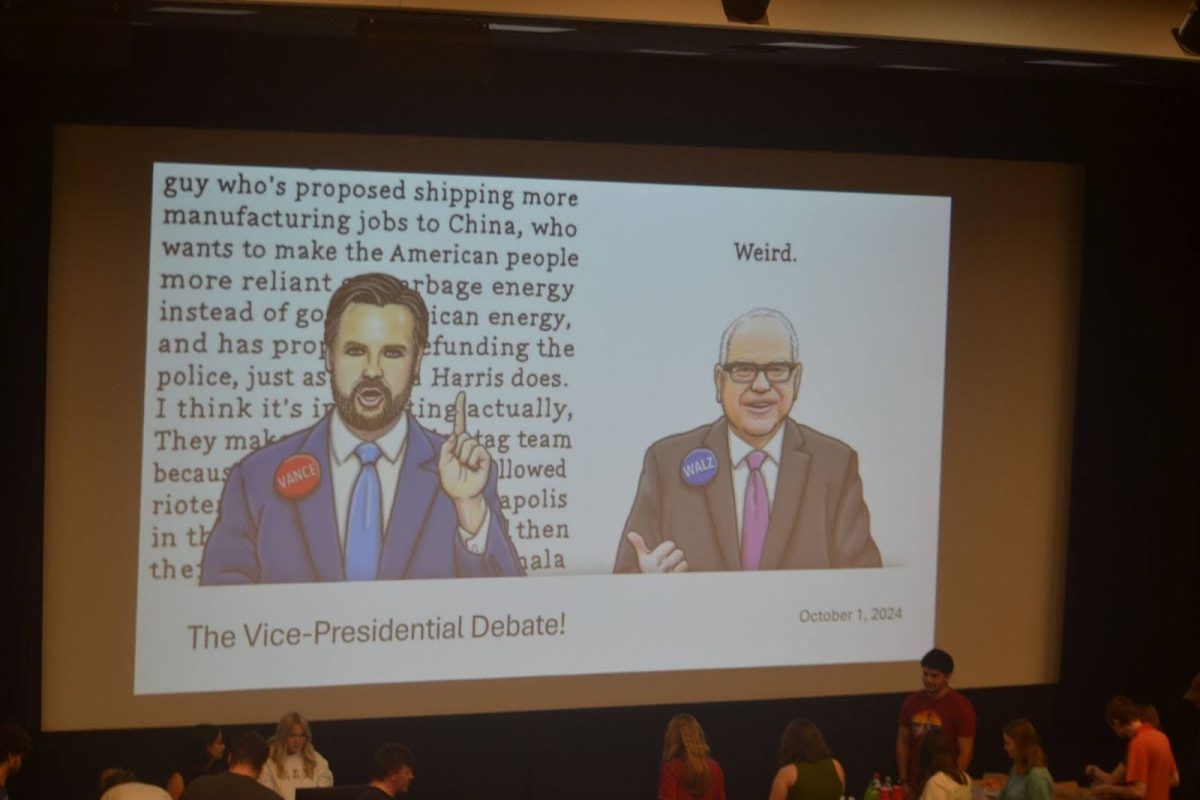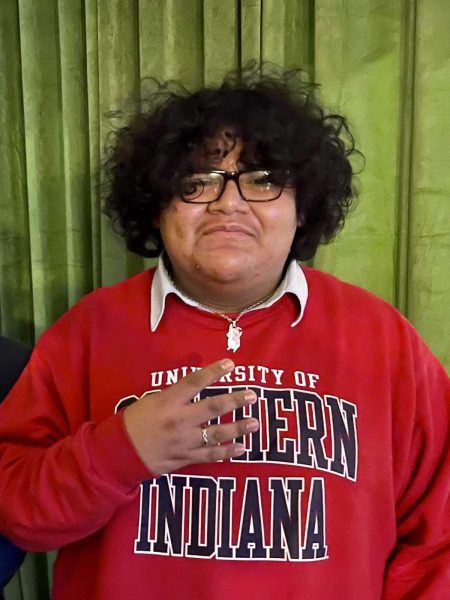Sen. J.D. Vance and Gov. Tim Walz participated in the first and only vice presidential debate of this campaign at 8 p.m. Tuesday.
The Political Science Society at USI held a watch party for students.
Students attended the event for a number of reasons. Some said that they attended because their class offered mandatory or extra credit. Others said they were curious about what the candidates had to offer. A few said they had nothing else going on and that this event was a way to get out of their dorm or apartment.
Regardless, the event was hosted by PSS to help students understand what is currently going on in the election and learn more about the candidates, policies and stands on different topics students may be interested in.
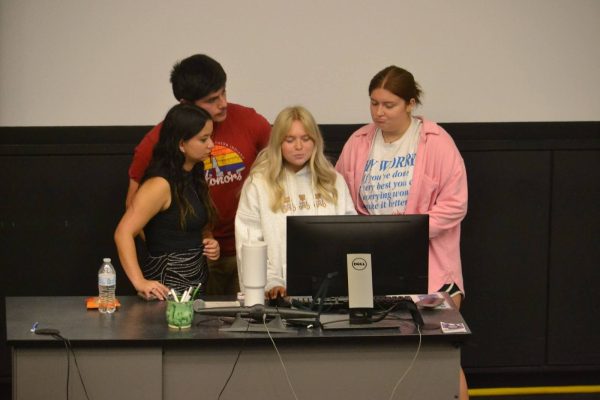
Hiro Bernardi, vice president of PSS, said that with community, political science can be discussed no matter the similarities or differences with others.
“We want to connect with people on political science,” she said. “It doesn’t matter where you come from. It doesn’t matter what your views are. Just as long as you can find some sort of community talking about political science. It’s also for teaching people about what’s going on right now, and talking about who are the vice presidents. Are we getting involved, and are we going to vote? Things like that.”
Samantha Flashaker, president of PSS, spoke to students about politics and the roles of the vice presidents.
“We wanted to run this event so that students were able to have education towards politics and the system that we live in. Not a lot of students know what the vice president’s role is,” she said. “Liberal Arts threw the presidential debate [watch party], and that was a hit. We thought that we’d be able to provide students that same exact opportunity with the vice presidential debate.”
Mary Morris, associate professor of political science, spoke about the purpose of PSS and her thoughts about the event and debate itself.
“The Political Science Society is nonpartisan, so they’re not taking a side for the Democrats or the Republicans,” she said. “I think it’s a great idea to show the debate and get other students to come here, even ones who aren’t political science students, because you guys are all going to be voters. You need to have the information.”
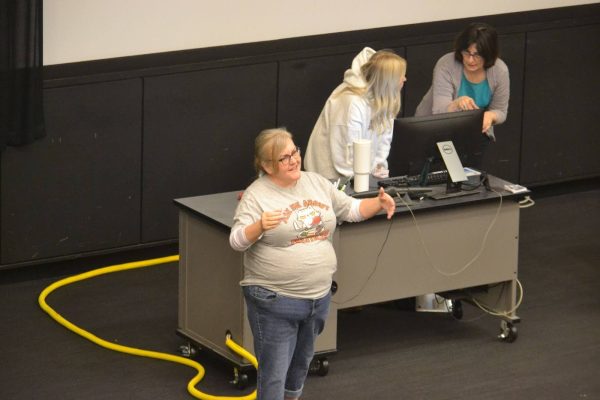
Before the debate, Morris gave a presentation about related topics, such as what “swing states” are, the importance of this debate and the background of the candidates.
“Only 3% of people don’t lean left or right, so the debate tonight is about getting those people to decide, am I going to vote for Harris or am I going to vote for Trump?” she said. “And usually, a vice presidential debate is not that big a deal. This year, however, because Trump and Harris only debated the one time, and he has said he’s not going to debate against her again, this one’s going to bring us some new information.”
During the commercial break, Linus McKinney, junior year literature major, noticed a difference between Vance and Walz in terms of streaming television readiness.
“He [Waltz] looked a little uncomfortable, and I get that because he hasn’t been in the national spotlight as much as Vance, who had a major cynic campaign,” he said. “He did book tours and stuff. But I think Walz has gotten more comfortable as the debate has gone on, and I think that’s served them really well.”
He also said Vance is trying to correct himself by being friendly towards his opponent.
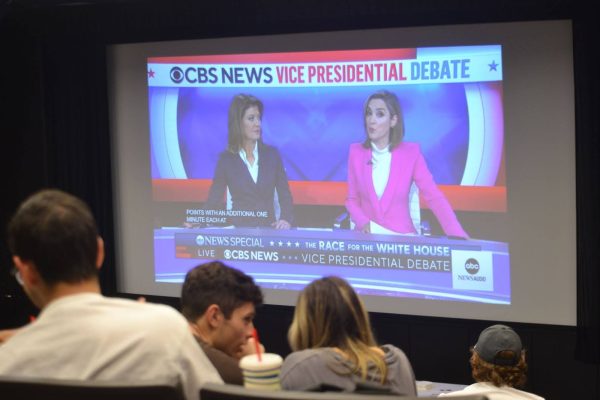
“Something weird is that I think that Vance is sort of trying to overcompensate,” McKinney said. “He’s said some pretty complimentary things of Walz. So far, he’s been like, for example, ‘You know, I think that you care about the border, Tim, but I don’t think Kamala does.’ And I think he’s trying to overcompensate for the fact that he’s been considered weird and mean by the national media. I think that he’s trying to appear more approachable.”
Next to McKinney was Cole Barnett, sophomore year psychology and political science major, who said both candidates were putting in efforts to appeal to the working class.
“I think that Vance especially has been trying to appeal to working-class people, because every single time he talks, he’s like, ‘Oh, I’m, by the way, guys, I’m poor. I’m from Ohio. My mom almost overdosed,’” Barnett said. “All this stuff. It’s like, well, you went to Yale. But yeah, they both tried to appeal to working-class people.”
He said this debate was not as interesting as the last one, as the presidential debate was “pretty crazy.”
Before the candidates gave their closing statements, Alex Mundy, sophomore English major, expressed the importance of a respectful and meaningful debate and the importance that Gen Z votes in this election.
“As far as things that I’m taking away from this debate is just reminding we as young people, we as Gen Z, we need to vote,” Mundy said. “If all of us decided to register and vote, our generation could really make a change in this election.”
Mundy said voting to keep democracy moving forward is a positive thing.
After the watch party ended and everyone left for the night, Oana Armeanu, associate professor of political science and chair of political science, said the high attendance showed how beneficial the watch party was.
“Based on the attendance and the questions that they were asking, I think students were interested and really wanted to participate,” she said. “So I was pleasantly surprised that we had such good attendance. We also had organized a similar event for the first presidential debate and also had very good participation, and students were interested.”
Armeanu gave her opinion on the vice presidential debate.
“They tried to show more moderation, especially Vance, who is known for making the kind of very extreme claims,” she said. “So he moderated a lot of his tone, and wanted to present himself as kind of like humble and coming from a working-class family and poor family. So he wanted a lot to emphasize this part of his background. But I thought that Walz did very, very well. He gave a lot of examples from Minnesota, which actually is a state with a very strong economy, and as we have heard, very good healthcare system. And I think that was his strong part because he has this experience as governor, which is a class in this contest because he has the experience of actually governing a state which is much more than being a senator.”
She said students can still watch the debate online and form their own opinions if they are undecided on which candidate to vote for.
“We actually have held voter registration drives, like our department and also the SGA, so there is a lot of opportunity now for USI students to register to vote and participate in this election,” she said. “I think if they haven’t got a chance to watch, they can still watch the debate online and form their own opinion.”


